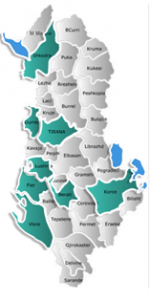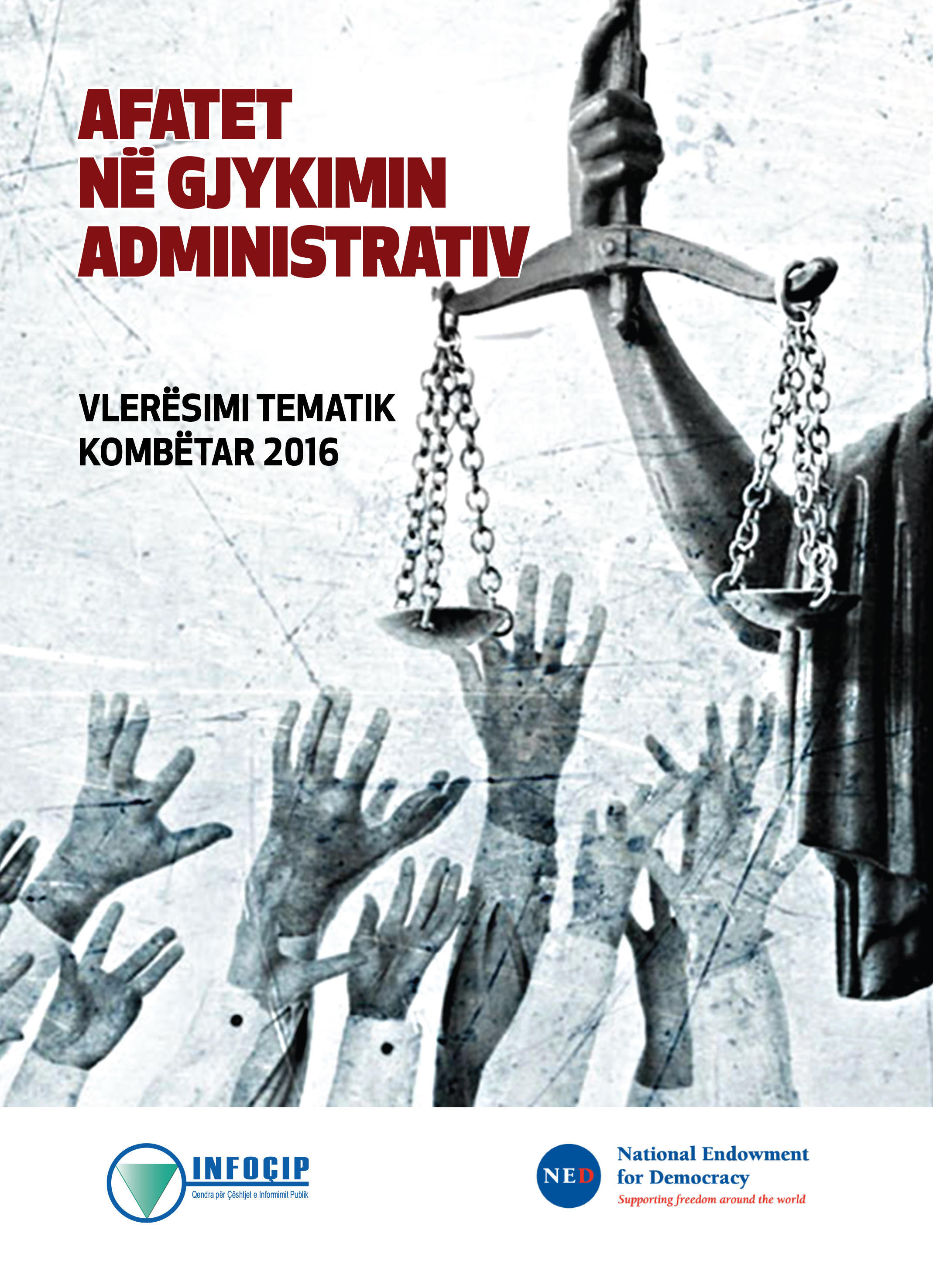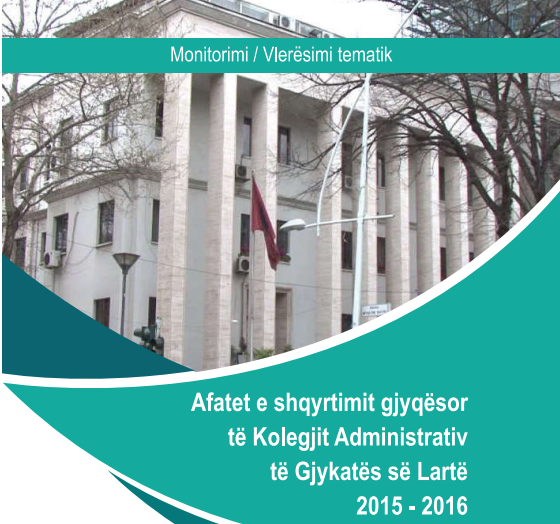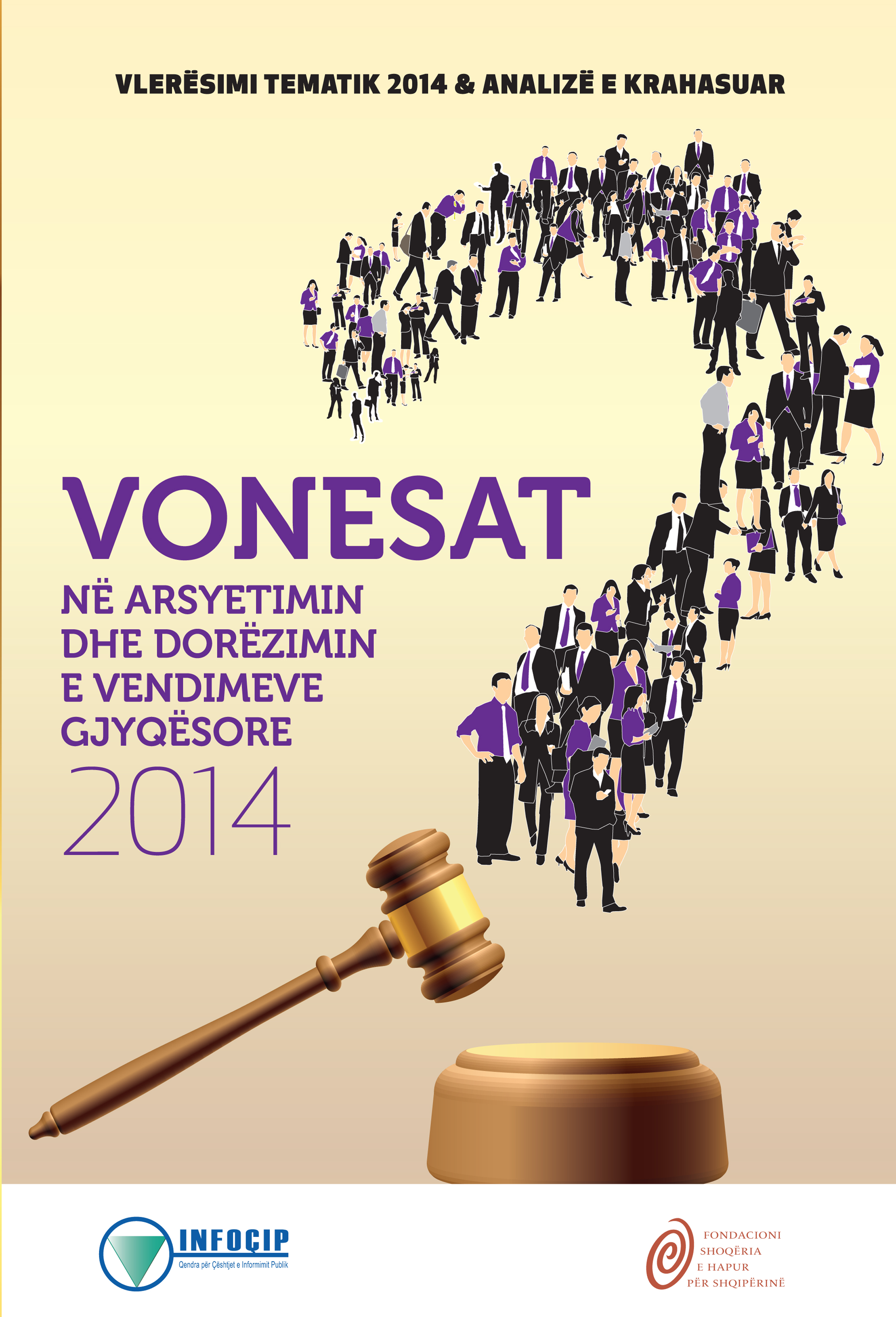“Lawfulness & Transparency of decision-making process in Durres Municipal Council and the Public Participation”, monitoring findings released for the media by INFOCIP
 Durres, July 13, 2013. Center for Public Information Issues announced in a media event in Durres the findings of the monitoring Report titled: “Lawfulness & Transparency of decision-making process in Durres Municipal Council and the Public Participation”. This Report is prepared and published by the Center for Public Information Issues for the second consecutive year now, supported by the National Endowment for Democracy (NED), in Washington D.C.
Durres, July 13, 2013. Center for Public Information Issues announced in a media event in Durres the findings of the monitoring Report titled: “Lawfulness & Transparency of decision-making process in Durres Municipal Council and the Public Participation”. This Report is prepared and published by the Center for Public Information Issues for the second consecutive year now, supported by the National Endowment for Democracy (NED), in Washington D.C.
The monitoring aims at measuring and evaluating the compliance of the Council’s activity with the requirement of the Law 8652, dated 31.7.2000 “On the Organization and Functioning of Local Governance”, as amended, especially with those provisions grouped in Chapter IV of this law.Primary object to monitoring and assessment is the observance of the articles 33, 34 and 35 of the law 8652 by the Municipal Council of Durres while performing its decision-making functions .These articles set the modalities of the discussion(including the one with the public), voting process,announcement and entry into force of the decisions of the Municipal Council. Functioning of the Council in compliance with these legal provisions is a judicial and factual condition to guarantee a lawful and transparent decision-making process, through ensuring public participation and effective access to the local legislation. A second focus of measuring and evaluation in this year’s monitoring is the legal time limits that regulate the activity of the Municipal Council, as provided for in Chapter VI of the Law 8652 “On Organization and Functioning of Local Governance”, as amended. Expiration of these functional time limits may lead to the dissolution of the City Council.The period covered under this monitoring was 12 months, July 2012-July 2013. Below there is an Executive Summary of the monitoring findings, as they were announced infront of the media in the premises of the “Aragosta” Hotel in Durres.
I. FUNCTIONING OF MUNICIPAL COUNCIL (frequency & schedules)
During the monitoring period, July 26, 2012 – July 12, 2013, the Municipal Council of Durres carried out a diminished decision-making activity for reasons to be only provided by the council itself. The monitoring activity reveals that in a time frame of 12 months, the Municipal Council convened only three times in plenary sessions, respectively on October 1, 2012, November 5, 2012 and, the last time, January 11, 2013. Since then, the Council has not convened in regular session, thus violating paragraph 2 of Article 31 of the Law No. 8652, “On Organization and Functioning of Local Governance”, which states: “The schedule for the regular [ordinary] meetings is decided by the Council itself, but not less than one per month.”
On April 11, 2013, the Municipal Council of Durres went beyond the last legal deadline of three successive months without convening in a plenary session, consuming the legal condition foreseen for its dissolution, as clearly stipulated in Article 38 “Dissolution of the Commune or Municipality Council”, whose letter ‘a’ of first paragraph states: “1. The Municipal or Communal Council can be dissolved by the Council of Ministers before the termination of the regular mandate in the following cases: a) It does not meet for an uninterrupted period of three months;”
Likewise, paragraph 8 of Article 31 “Functioning of Municipal or Commune Council” states: “8. Where a Council is unable to function due to a lack of a quorum for a period of three consecutive months, starting from the last meeting date, the Council is dissolved. The Secretary of the Council notifies the Prefect ten (10) days after the three months of nonfunctioning.” On April 19, 2013, the Secretary of the Municipal Council notified the Prefect about this situation with the document, protocol no. 2114, signed by the Chairman of the Council. This official correspondence is in conformity with the legal requirements and within the deadline set forth in the second sentence of paragraph 8 of Article 31. (See facsimiles, p. 29)
During this monitoring period, the Municipal Council of Durres failed to pass the Fiscal Package of 2013 (including local taxes and fees) and the Budget of 2013 (including wages of local administration, public investments, etc.). In fact, these are its two most important decisions. Failure to adopt the budget leads to the dissolution of the Municipal Council. This is foreseen in letter ‘b’ of paragraph 1 of Article 38, which states: “1. The Municipal or Communal Council can be dissolved by the Council of Ministers before the termination of the regular mandate in the following cases: b)It is not able to adopt the budget three months after the deadline determined in Article 19 of this Law;”
July 12, 2013, marked the six-month period since Municipal Council of Durres convened for the last time in a plenary session (on January 11, 2013). The Law No. 8652, ‘On Organization and Functioning of Local Governance’, in letter ‘e’ of paragraph 4 of Article 27,maintains that: “4. The Councilor’s mandate may expire earlier, with the proposal of the Mandate Commission, in case of: e) absence from the council meetings for a period of six months;” INFOÇIP published the results of this monitoring on July 13, 2013, one day after the expiration of this deadline. In this case, expiration of mandate applies to the local councilors as individuals, not to the council as an entity.
II. DECISION-MAKING ACTIVITY OF THE MUNICIPAL COUNCIL
VOTING OF DECISIONS
In the 12-month course of exercising its mandate, the Municipal Council of Durres adopted a total of 70 decisions, of which 38 decisions were approved in year 2012 and the rest in year 2013. The majority (66) of these decisions were of individualaffairs. The monitoring revealed that councilors voted openly in all cases, in violation of paragraph 1 of Article 33 of the Law on Organization and Functioning of Local Governance, which explicitly defines that: “All voting for individual affairs are by secret ballot.”
During the monitoring period, only decisions of the Municipal Council were of normative character, in which case voting was open in compliance with the legal provision. Municipal Council Decision No. 123, ‘On Adoption of General Local Plan of the Municipality of Durres’ was the most important decision among the aforementioned four decisions. Prior to voting, the Municipal Council had undertaken consultations with stakeholders and the public, as required by paragraph 1 of Article 35 of the Law on Organization and Functioning of Local Governance. This meeting, attended by many people at Adriatic Hotel, was organized and supported by INFOÇIP with its own structures in Durres, in the framework of a partnership established with the Municipal Council of Durres more than two years ago.
DECISIONS ADOPTED ON THREE-FIFTH VOTING
The Law on Organization and Functioning of Local Governance, as amended, provides only one case in which decision-making requires 3/5 of the votes of all Municipal Council members. This case is set forth in letter ‘e’ of Article 32 of this law, ‘Approve the change of the ownership or giving in use [usufruct] to third parties of its property’. During the 12-month period covered in this monitoring, the Municipal Council of Durres has adopted five decisions on change of ownership or usufruct of its property to third parties. In all these cases, the voting has been almost unanimous in conformity with the paragraph 4 of Article 33 of this law.
In the case of these decisions, paragraph 1 of Article 35 of the Law on Organization and Functioning of Local Governance, as amended, charges the Municipal Council with the obligation to hold public hearing sessions with the community in each and every case. The monitoring team found out that no such sessions have been held during the monitoring period.
Likewise, the manner of voting should also be considered carefully in the case of these decisions, which, unless they are individual affairs, must always be by secret ballot. Similar to the case above, the Municipal Council did not comply with the legal requirement stemming from paragraph 1 of Article 33 of the Law on Organization and Functioning of Local Governance.
CIRCULATING DECISIONS
Irrespective of the fact that the last meeting was conducted on January 11, 2013, the Municipal Council resumed adoption of decisions of circulating practice beyond this date, respectively on January 23, February 28, March 25, and April 26, concerning economic assistance and disability benefit payments. Such decision-making practice and the procedure followed in these cases are not foreseen in any of the articles of the Law on Organization and Functioning of Local Governance, as amended. This practice, utilized by the Municipal Council of Durres in year 2012 as well, remains to be considered extralegal.
CITIZENS’ PARTICIPATION
During the monitoring period, the Municipal Council meetings have been open to the public, in pursuance of the provisions of Article 34 of the Law on Organization and Functioning of Local Governance. Citizens, including those mobilized by INFOÇIP, have normally attended meetings of the Municipal Council in the meeting hall. The highest attendance was observed in the meeting of January 11, 2013, in which the General Local Plan of the Municipality of Durres was adopted upon Municipal Council Decision No. 123. More than 20 residents of second neighborhood (an archeological zone of ‘A’ Category) attended the meeting and appealed directly to local councilors to include in the General Local Plan a provision that permits construction of new dwelling units or, at least, reconstruction of the existing buildings in their zone, regardless of the fact that their neighborhood was an archeological site.
The infrastructure of the Municipal Council meeting room allows for limited attendance of citizens. The monitoring team has observed that there are no sufficient seats for the municipal administration staff in order to be able to attend the Municipal Council meetings. Similar finding applies for local journalists that wish to report the Municipal Council meetings. This issue practically affects the guarantee of the Constitution of the Republic of Albania. Article 23/3 of the Constitution states: “3. Everybody is given the possibility to follow the meetings of collectively elected organs.”
ANNOUNCEMENT OF MUNICIPAL COUNCIL MEETINGS
The Secretary of the Municipal Council of Durres has mainly used email and phone to inform councilors and other stakeholders of Municipal Council meetings. INFOÇIP and Citizens’ Transparency Office of Durres have been regularly informed by phone 3-4 days in advance of any Municipal Council meeting. While it ensured normal conditions for attendance to the monitoring team, this practice poses objective limitations in terms of giving notice to all interested parties to attend Municipal Council meetings in the practical sense as well as in the meaning provided for in the second paragraph of Article 34 of Law on Organization and Functioning of Local Governance.
While not specifically required by the law, internet would be one of the potential ways to make announcements on Municipal Council meetings. INFOÇIP monitored the official website regularly during the monitoring period and found out that the website of the Municipality of Durres was never used to make announcements on the date, time, and agenda of the Municipal Council meetings.
With regard to notice in media, this practice will be verified in the coming months, because until February 2013 the city of Durres did not have a local TV that could be used to make announcements on Municipal Council meetings, as stipulated in the law concerning this procedure.
DATE, PLACE, TIME AND AGENDA OF THE MEETINGS
Another provision (second sentence) of paragraph 2 of Article 34 of the Law on Organization and Functioning of Local Governance, as amended, states: “The announcement contains the date, place, time, and agenda [of the meeting]. An assessment of all announcements made during the monitoring period reveals that the Secretary of the Municipal Council has fully complied with this legal requirement.
PUBLICATION OF DECISIONS
Article 35 of the Law on Organization and Functioning of Local Governance explicitly provides that “The council shall have the obligation to announce all decisions in public places within the territory of the commune or municipality and [according to its possibilities] the council also uses other forms to publicize its decisions.” In consideration of the concerning situation, in 2001 INFOÇIP digitalized the decisions of the Municipal Council of Durres. All decisions adopted from year 2007 to date are published and accessible online.
Early this year (2013), the digital database of the Municipal Council decisions was re-entered from starch into the new online portal, www.vendime.al, which provides important advantages compared with the old archive system, particularly with regard to query/search decisions with key words. The webpage customized for Durres, (www.vendime.al/durres/) is linked to the official website of the Municipality of Durres. In cooperation with the local structures of INFOÇIP, the Secretary of Municipal Council has delivered for online publication at www.vendime.al all the decisions adopted by the Municipal Council during the monitoring period, in conformity with the requirements of Article 35 of the Law on Organization and Functioning of Local Governance, as amended.
III. PRIMARY RECOMMENDATIONS
I. MAIN IDENTIFIED PROBLEM
INFOÇIP finds out that the Municipal Council of Durres lost its legitimacy of functioning during the period covered in this monitoring. Article 38 of the Law on Organization and Functioning of Local Governance states that the Municipal or Communal Council can be dissolved by the Council of Ministers before the termination of the regular mandate in the following cases: a) It does not meet for an uninterrupted period of three months; b) It is not able to adopt the budget three months after the deadline determined in Article 19 of this Law; and, c) It commits serious violations of the Constitution or other laws. Concretely speaking, the Municipal Council of Durres ‘slipped’ to the conditions set forth in letters ‘a’ and ‘b’ of the paragraph 1 of this article due to its failure to act.
Likewise, July 12, 2013, by which time this monitoring came to an end, marked the end of the six month period of nonfunctioning of the Municipal Council, whose last plenary session meeting was held on January 11, 2013. The Law No. 8652, ‘On Organization and Functioning of Local Governance’, in letter ‘e’ of paragraph 4 of Article 27, explicitly states that: “The Councilor’s mandate may expire earlier, with the proposal of the Mandate Commission, in case of: e) absence from the council meetings for a period of six months;”autonomously
INFOÇIP gives the following recommendations:
- Superior authorities recognize officially the dissolution of the Municipal Council (dissolution by the competent authority) because of failure to exercise functions for a period beyond legal time limits;
- Call new elections for Municipal Council of Durres as soon as possible in compliance with the Electoral Code of the Republic of Albania;
- In the period from the election date until the constitution of the new council, the dissolved council must resume exercising limited functions and adopt decisions only in urgent cases as foreseen in Article 36/1 of the Law on Organization and Functioning of Local Governance.
LAST RELEASED PUBLICATION
MONITORING REPORT
Recent reports/studies
Partners / Donors
Local Branches
- Citizens' Transparency Office, Durrës (19)
- Citizens' Transparency Office, Korça (9)
- Election Situation Chamber (11)
- JUDICIARY (1)
- NED (11)
- www.vendime.al (5)
Foto lajm

- CPII anounces the monitoring result for Durres Municipal Council. It must be re-elected
Where we work














